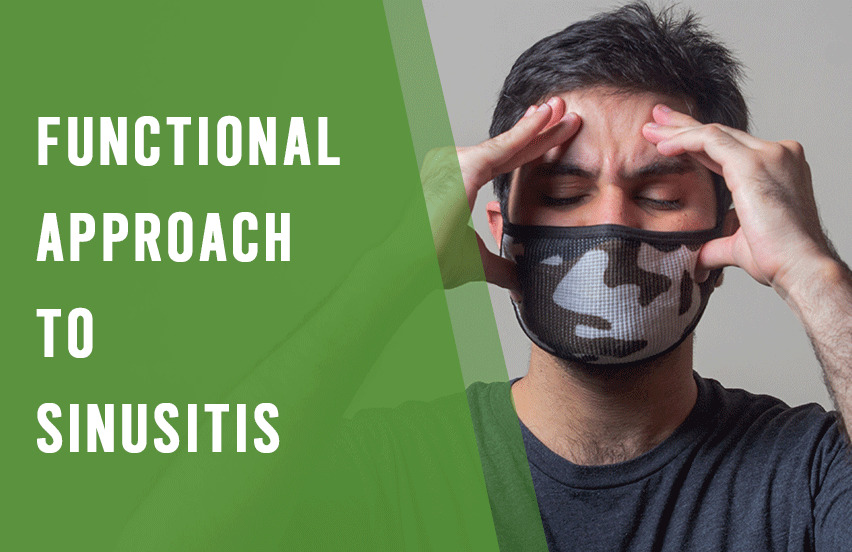
Functional medicine is a healthcare method that prioritizes identifying and addressing the underlying causes of illness rather than solely treating the symptoms. It considers the unique genetic, environmental, and lifestyle factors contributing to an individual’s health.
Explanation of recurring Sinusitis is characterized by inflammation and infection of the sinuses, hollow spaces in the skull. Unlike acute Sinusitis, which typically lasts for a short duration, recurring Sinusitis involves frequent episodes of sinus inflammation, often accompanied by symptoms such as facial pain, nasal congestion, and headaches.
Understanding Recurring Sinusitis
Sinusitis occurs when the sinus cavities become inflamed and blocked, accumulating mucus and bacteria. Various factors, including infections, allergies, structural issues, and immune system dysfunction, can cause it.
It may be attributed to a combination of factors. Common causes include chronic inflammation, unresolved infections, allergies, anatomical abnormalities (such as nasal polyps or deviated septum), immune system dysfunction, and environmental triggers.
Recurring sinusitis can significantly impact an individual’s quality of life. You may experience facial pain or pressure, nasal congestion, postnasal drip, headaches, fatigue, and a decreased sense of smell. These symptoms can disrupt sleep, cause difficulty concentrating, and affect overall well-being.
Principles of Functional Medicine
The holistic approach to Functional healthcare medicine takes a holistic view of the body. It’s important to acknowledge the interdependence of different systems and understand that good health requires more than just being disease-free. It emphasizes addressing physical, emotional, and environmental factors that influence health.
Focus on underlying causes. Functional medicine aims to recognize and tackle underlying issues. Underlying causes of a health issue rather than just treating the symptoms. By understanding the root causes, functional medicine practitioners can develop targeted treatment plans tailored to each individual’s needs.
Individualized treatment plans Functional medicine recognizes that each person is unique and requires personalized care. Treatment plans are developed based on a comprehensive evaluation of an individual’s health history, lifestyle, genetics, and environmental factors.
Functional Medicine Approach to Treating Recurring Sinusitis
Comprehensive patient evaluation Functional medicine practitioners conduct a thorough evaluation to understand the patient’s health status. It includes detailed medical history, lifestyle and environmental factors, and nutritional assessment.
Identifying root causes Through a detailed evaluation, functional medicine practitioners aim to identify the specific factors contributing to recurring Sinusitis. Common root causes may include chronic inflammation, allergies and sensitivities, microbiome imbalance, nutrient deficiencies, and structural issues.
Targeted interventions Based on the identified root causes, functional medicine practitioners develop a personalized treatment plan to address recurring Sinusitis. It may involve a combination of interventions:
- Dietary modifications: Eliminating inflammatory foods and incorporating a nutrient-dense, anti-inflammatory diet can help reduce inflammation and support immune function.
- Nutritional supplementation: Certain supplements, such as vitamins, minerals, probiotics, and herbal preparations, may be recommended to address specific nutrient deficiencies, boost immune function, and support sinus health.
- Allergy testing and avoidance: Identifying and avoiding allergens or irritants that trigger sinus inflammation can help reduce the frequency and severity of episodes.
- Gut health optimization: Enhancing gut health through probiotics, prebiotics, and gut-healing protocols can positively impact immune function and reduce systemic inflammation.
- Lifestyle changes: Stress management techniques, regular exercise, and adequate sleep are important aspects of managing recurring Sinusitis and supporting overall health.
Collaboration with other healthcare professionals Functional medicine practitioners often collaborates with other healthcare professionals, including allergists and ear, nose, and throat (ENT) specialists. This integrative approach ensures comprehensive care and allows for appropriate referrals when necessary
.
Case Study/Example
Patient history and symptoms For example, consider a patient with recurring Sinusitis who experiences frequent episodes of facial pain, nasal congestion, and fatigue. They have tried multiple courses of antibiotics without long-term relief.
Functional medicine assessment The functional medicine practitioner conducts a detailed evaluation, including a thorough medical history, assessment of lifestyle factors, and nutritional analysis. The patient’s medical records reveal a history of chronic inflammation, seasonal allergies, and a diet high in processed foods.
Treatment plan and interventions: The practitioner develops a personalized treatment plan based on the assessment. It includes eliminating inflammatory foods from the patient’s diet, prescribing a targeted supplement protocol to address nutrient deficiencies and support immune function, and recommending allergy testing and avoidance strategies.
Progress and outcomes Over time, the patient adheres to the treatment plan and experiences a reduction in the frequency and severity of sinusitis episodes. They report improved energy levels, reduced facial pain, and better overall well-being.
Conclusion
Functional medicine offers a comprehensive and individualized approach to addressing the underlying causes of recurring Sinusitis. By identifying and addressing factors such as chronic inflammation, allergies, microbiome imbalance, and nutrient deficiencies, functional medicine practitioners aim to provide long-term relief and improve overall health.
Potential benefits and limitations of a functional medicine approach to recurring Sinusitis include personalized care, a focus on root causes, and a holistic view of health. While functional medicine can be helpful, it is not a replacement for traditional medical care and may not be appropriate for everyone or every condition.
For individuals struggling with recurring Sinusitis, seeking personalized care from a functional medicine practitioner may provide new insights and options for managing the condition. By addressing the underlying causes and tailoring treatment plans to individual needs, functional medicine offers a promising approach to improving sinus health and overall well-being.


